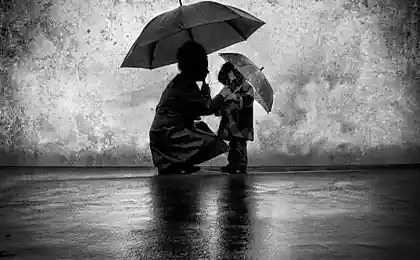501
If the child is difficult
That's the most common situation: you are waiting for the guests. Your child is also excited about this celebration, it helps you set the table, wash vegetables carefully, lays out the napkins, blooms in praise. This attachment behavior, he wants to be with you, want you like, to make common cause.
Here guests at the door – and the child suddenly embarrassed, hides behind you, you should labour to persuade him to come out and say Hello. This behavior of affection, he is cautious with strangers, not "friends", older and seek the protection of a parent.

You sit at the table, fascinated by the interesting conversation, and the child like the chain broke: noisy, runs, pulls you. This behavior of affection: he suffers from anxiety, seeing that your attention has hold of a stranger and wants your attention as confirmation that your relationship is all right.
You lose patience, get angry at it and put out of the room. He cries loudly beating on the door, throwing a tantrum. This behavior of affection: you have given him to understand that I can terminate the connection with him, more symbolically interrupted her, closing the door, he protests with all his strength, trying to reconnect..
You pity him, you go to him, hug, lead to wash. He had for some time sobbing, then promises that it will behave well and you let him stay. He soon calms down, curled up on your lap and really not naughty. This behaviour of attachment – the connection was restored, tension eased, the fear was released, the child is exhausted, and to recuperate better next to a parent.
Perhaps you never thought about it that way. Perhaps you thought, or you were told the surrounding that all this is happening because the child is spoiled, or rude, or damaged, or excited. It is actually easier and all the more serious.He just is craving to contact you. That's all. If it is to understand and be able to see how the state of your relationship affect the state and behavior of the child, many cases of "bad behavior" will stand her in a different light."
"We remember that a child's relationship with the parent it is even more (than for us the relationship with the partner — approx. ) are significant, it more depends to the love of a parent to him was unshakable as a rock, so this relationship could not be interrupted nor an error, nor stupid nor imperfect character, appearance, abilities. The attempt to establish the child "bar of expectations" of its plunge into the deepest stress, causing a strong protest. And instead of the expected "educational effect" of their notations, and obeyed, we obtain explicit or implicit sabotage and sometimes paradoxical reaction: the child increases the behavior or quality that we are often unhappy. How does it work?
Imagine that you are walking along the path over the precipice (and this is in a sense a metaphor of our lives), and insures you a strong rope, which holds on the side of the person you absolutely trust, more than myself. So the child perceives their attachment to parent and parent to him. And suddenly you feel that the rope is weakened, sagged somehow. What happened? Released? forgot? quit? Gone? To ask you can not to go out too – scary step to step, without insurance. What will you do?
Right, tugging at the rope, hoping that she was just a little slack now and again will tighten and become strong and reliable as before. Pull with bated breath – and suddenly jerks, and it turns out that on that end it released? But if you do not pull, how to know?
That is what the child is doing when he has doubts about the strength of the attachment. Jerks the rope. Again samples the behavior that, from experience, puts the attitude of the parent at risk. "You're still my adult? like he asks. Even if I do that? Even if I'm bad? I can't live in this anxiety, the answer soon so I know for sure".
... If a parent turns to let the child know that you, my dear, of course, breaking anything, but don't worry, I'll still love, I'm with you, you can count on me, the rope is strong, – the child calms down and is able to change the behavior. If the adult response also starts, he falls under the power of anxiety "he would do so, I'm a bad parent, I fail, I fall, in spite of this it need to be harder with him, to teach it in the future" and all that sort of thing – the question of the child is not removed, and only gets sharper.
So, you should wait then? Yeah, repetition and the intolerable to parent behavior.
Author: L. Petranovskaya "If the child is difficult"
P. S. And remember, just changing your mind — together we change the world! ©
Join us in Facebook , Vkontakte, Odnoklassniki
Source: stranamam.ru/post/9634365/
Here guests at the door – and the child suddenly embarrassed, hides behind you, you should labour to persuade him to come out and say Hello. This behavior of affection, he is cautious with strangers, not "friends", older and seek the protection of a parent.

You sit at the table, fascinated by the interesting conversation, and the child like the chain broke: noisy, runs, pulls you. This behavior of affection: he suffers from anxiety, seeing that your attention has hold of a stranger and wants your attention as confirmation that your relationship is all right.
You lose patience, get angry at it and put out of the room. He cries loudly beating on the door, throwing a tantrum. This behavior of affection: you have given him to understand that I can terminate the connection with him, more symbolically interrupted her, closing the door, he protests with all his strength, trying to reconnect..
You pity him, you go to him, hug, lead to wash. He had for some time sobbing, then promises that it will behave well and you let him stay. He soon calms down, curled up on your lap and really not naughty. This behaviour of attachment – the connection was restored, tension eased, the fear was released, the child is exhausted, and to recuperate better next to a parent.
Perhaps you never thought about it that way. Perhaps you thought, or you were told the surrounding that all this is happening because the child is spoiled, or rude, or damaged, or excited. It is actually easier and all the more serious.He just is craving to contact you. That's all. If it is to understand and be able to see how the state of your relationship affect the state and behavior of the child, many cases of "bad behavior" will stand her in a different light."
"We remember that a child's relationship with the parent it is even more (than for us the relationship with the partner — approx. ) are significant, it more depends to the love of a parent to him was unshakable as a rock, so this relationship could not be interrupted nor an error, nor stupid nor imperfect character, appearance, abilities. The attempt to establish the child "bar of expectations" of its plunge into the deepest stress, causing a strong protest. And instead of the expected "educational effect" of their notations, and obeyed, we obtain explicit or implicit sabotage and sometimes paradoxical reaction: the child increases the behavior or quality that we are often unhappy. How does it work?
Imagine that you are walking along the path over the precipice (and this is in a sense a metaphor of our lives), and insures you a strong rope, which holds on the side of the person you absolutely trust, more than myself. So the child perceives their attachment to parent and parent to him. And suddenly you feel that the rope is weakened, sagged somehow. What happened? Released? forgot? quit? Gone? To ask you can not to go out too – scary step to step, without insurance. What will you do?
Right, tugging at the rope, hoping that she was just a little slack now and again will tighten and become strong and reliable as before. Pull with bated breath – and suddenly jerks, and it turns out that on that end it released? But if you do not pull, how to know?
That is what the child is doing when he has doubts about the strength of the attachment. Jerks the rope. Again samples the behavior that, from experience, puts the attitude of the parent at risk. "You're still my adult? like he asks. Even if I do that? Even if I'm bad? I can't live in this anxiety, the answer soon so I know for sure".
... If a parent turns to let the child know that you, my dear, of course, breaking anything, but don't worry, I'll still love, I'm with you, you can count on me, the rope is strong, – the child calms down and is able to change the behavior. If the adult response also starts, he falls under the power of anxiety "he would do so, I'm a bad parent, I fail, I fall, in spite of this it need to be harder with him, to teach it in the future" and all that sort of thing – the question of the child is not removed, and only gets sharper.
So, you should wait then? Yeah, repetition and the intolerable to parent behavior.
Author: L. Petranovskaya "If the child is difficult"
P. S. And remember, just changing your mind — together we change the world! ©
Join us in Facebook , Vkontakte, Odnoklassniki
Source: stranamam.ru/post/9634365/
























